The International Monetary Fund (IMF) has issued a cautionary note to Asian central banks, advising them to maintain a focus on domestic inflation concerns and to avoid tethering their policy decisions too closely to anticipated actions by the US Federal Reserve.
Recent market dynamics, influenced by diminished expectations for immediate interest rate cuts by the Fed, have triggered sustained appreciation of the US dollar, exerting downward pressure on some Asian currencies, including the Japanese yen and the South Korean won. Krishna Srinivasan, director of the IMF’s Asia and Pacific department, highlighted the profound and immediate impact of US interest rates on Asian financial conditions and exchange rates during a Thursday briefing.
Srinivasan emphasized that fluctuations in expectations regarding Fed monetary policy, driven by factors unrelated to Asian economic stability, necessitate a cautious approach from regional central banks. “We recommend Asian central banks to focus on domestic inflation, and avoid making their policy decisions overly dependent on anticipated moves by the Federal Reserve,” he stressed, underscoring the importance of maintaining price stability within their respective economies.
READ:Alia Bhatt and Dev Patel Shine on TIME’s “100 Most Influential People of 2024” List
The IMF’s remarks underscore the dilemma facing some Asian central banks, as currency market volatility driven by Fed-related factors complicates their policy trajectory. Bank of Korea Governor Rhee Chang-yong echoed these sentiments during a separate IMF seminar, acknowledging the challenges posed by diminishing prospects for Fed rate cuts on the South Korean won.
In its World Economic Outlook, the IMF revised Asia’s growth forecast downward to 4.5% for the current year, compared to 5.0% in the previous year, but revised it upward by 0.3 percentage points compared to October projections. However, the outlook for 2025 remains positive, with projected growth of 4.3% for the region.
Srinivasan identified China’s economic trajectory as a critical factor for Asia’s overall growth prospects, highlighting the risks associated with a potential protracted slowdown in the world’s second-largest economy. While increased government spending could stimulate China’s economy, policies aimed at enhancing its supply capacity may exacerbate deflationary pressures and contribute to economic friction.
Additionally, Srinivasan flagged trade restrictions as another significant risk to Asia’s economic stability, noting the region’s heavy reliance on trade integration for growth. He emphasized that ongoing geoeconomic fragmentation poses a substantial risk to regional economic prosperity.
Conclusion: The IMF’s cautionary advice underscores the need for Asian central banks to maintain vigilance and autonomy in their policy decisions, particularly amid external uncertainties driven by shifts in US monetary policy. As Asia navigates through evolving economic landscapes, prioritizing domestic stability and resilience remains paramount to sustaining growth and mitigating risks.




